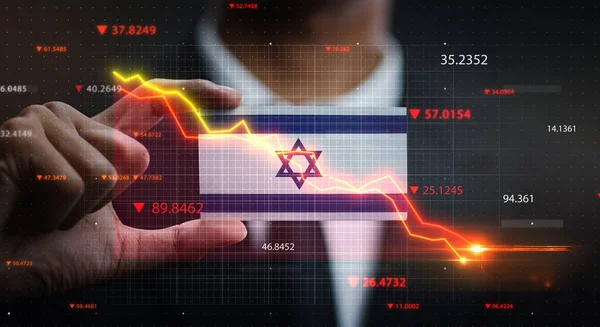Israel’s Economy During A Time Of War
Recent downgrades by Moody's would imply that the Israeli economy is the war's latest victim. But is that actually the case?

Recent downgrades by Moody’s have spotlighted the impact of the Gazan conflict on the Israel’s economy. Israel is in the midst of the longest and most expensive war in its history, facing enemies on several fronts. Naturally, reports of the negative impact of the war on the domestic and external transactions have raised considerable concern, leading to a raft of revised forecasts. Prior to the October 7th attack, the International Monetary Fund forecasted that the Israeli economy would expand by 3.4% in 2024. Today, these projections have been sliced to 1% to 1.9%.
The war’s conduct continues to be costly. The Bank of Israel estimates that the cost of military outlays and civilian expenses, including temporary housings for thousands of Israelis who had to leave their homes in the north near the Lebanese border and in the south next to Gaza, to be 12% of the GDP.
Just how well as the economy performed since Oct 7th.
Figure 1 indicates that the economy continues to expand, although at a slower rate. Private consumption continues to grow in line with population growth. The one important sector that has been hit is fixed capital investment, residential and non-residential. Israel relied heavily on construction workers living in the West Bank. The war has cut off much of that source of labour and the entire construction industry has slowed. Compensating for this loss in national income, the government sector has expanded sufficiently such that total GDP has not contracted. Growth in government expenditures is primarily related to an expanded defense budget and to subsidize thousands of Israelis who have taken up temporary residence in central Israel, away from the war zones in the north and south.
Figure 1 Domestic Economy

Source: Moody's
The strength of the Israeli economy lies in the external sector, that is, trade and investment flows between Israel and the rest of the world. Remarkably, its current account balance continues to remain in the positive territory. Israel is a leading exporter of diamonds, medical equipment, software and military equipment---- all categories continue add to a current account surplus. The current account surplus reached 5% of GDP at the end of 2023.
Most importantly is the surge in the capital flows into the country. As one of the leading tech centres in the world, Israel continues to attract foreign investment, especially in cybersecurity. Moreover, Israeli tech companies generate considerable returns on investment from their overseas operations, further contributing to a positive capital account. Privately-held tech companies raised $7.2 billion in the first nine months of 2024. This compares favourably to the $6.9 billion was raised in the entire year 2023.
Figure 2 Balance of Trade, Capital Flows & Current Account

Source: Trading Economics
Israel’s exchange reserves which now stand at nearly $220 billion, compared to $200 billion at the start of the Gazan war. The Israeli Shekel continues to remain stable at $ 0.26. Israel’s healthy balance of payments means that the Bank of Israel is under no pressure to raise its interest rate to protect the currency.
Figure 3 Israel's Foreign Exchange Reserves

Moody’s downgraded the Israel’s bond rating on purely geopolitical grounds, citing the concerns for a prolonged war impacting the nation’s public finances. Earlier in 2024, the government’s operating deficit was forecasted to hit 6% of GDP, but has since grown to 8%. Moody’s goes on to state “there is no visibility on an exit strategy from the military conflict that would restore a level of certainty and security, on which the economy and business investment ultimately rely,”
Moody’s has taken a highly speculative approach, especially regarding the outlook on military and security issues. This is well beyond its normal line of work which involves looking at the public finances and balance of payments conditions. On the latter measure, Israel’s strength in its trade and external investment relations clearly defies the judgement of Moody’s. Moreover, the vote of confidence given by international investors in the values lying within the high-tech sector, also raises questions about Moody’s musings on the future of business investment.
In sum, Moody’s ratings have had no direct impact on the economy. Foreign investment continues to flow in. Israel enjoys the highest level of foreign exchange reserves in its history. The currency is stable and exports are holding up well. The equity markets in Tel Aviv and New York are supplying funds for the high-tech industries.
More By This Author:
Once Again, The Americans Plead With China To Curb Its Exports, To No Avail
Canada Will Be Caught In The Rise In US Trade Protection Measures
The Canadian Banks Find Reasons Not To Give Out Loans




Joseph Cox, would you agree with this?